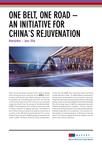
One Belt, One Road – An initiative for China's rejuvenation
China, the second largest economy in the world, is slowing down and entering the so-called new normal (新常态). Slower, moderate GDP growth rates will be achieved in the future. Nevertheless, the 7.4% GDP growth rate in 2014, the 6.9% rate in 2015 and the target rate of 6.5% for this year are remarkable compared to the EU Zone. The concept of “One Belt, One Road” (OBOR), first mentioned in 2013, continues to be at the centre of Chinese President Xi Jinping’s speeches. The initiative is part of China's long-term goals to develop the connectivity of countries on the Silk Road Economic Belt and 21st-century Maritime Road. Around four billion people are included in the scope of OBOR, starting in South East Asia crossing China, Central Asia, the Middle East and Eastern Africa and finally reaching Western Europe. The OBOR initiative is intended to provide peace and prosperity for the countries concerned. Despite the enthusiasm demonstrated by China for this grand strategy, which is sometimes labelled as the Chinese Marshall Plan, the strategic goals of OBOR are interpreted diversely. President Xi proposed three “togethers.” The first “together” is discussion among the parties concerned to identify projects involving cooperation for mutual benefit. The second is working together to realise the projects on the basis of common interest. The third is enjoying the benefits together from the fruits of this common endeavour.
OBOR principles
OBOR focuses on five principles: Financial Integration, Unimpeded Trade, Facility Connectivity, Policy Coordination and People-to-People Bond.
The first projects have already been started – mainly infrastructure projects, railway, telecommunication and environmental projects like water management. For instance, in June 2015, an initial contract for high-speed trains between Moscow and Kazan was signed by Russia and China. Another example is the $1.2 billion tunnel project in Penang in Malaysia which will be built by Chinese companies.
Political coordination is obviously required when it comes to state-level projects. Yet not only states are concerned, but also local and regional organisations are also encouraged to cooperate. The Asian Investment Infrastructure Bank (AIIB) will focus on financing infrastructure projects in coordination with the New Development Bank, the Shanghai Cooperation Bank and the Silk Road Fund or even the Association of Southeast Asian Nations (ASEAN). Germany is a ratified member of the bank and holds nearly 5% of the capital of the bank located in Beijing and is therefore a major stakeholder alongside China, Russia and India.
Unimpeded Trade will be fostered by free-trade zones, double tax treaties and customs cooperation.
People-to-People Bond aims at improving cultural exchanges and cooperation between countries of the OBOR initiative in different media fields like cinema, television and radio, as well as in other fields like tourism, science and technology. For topics like poverty, health and the environment, the coordination between countries and NGOs is also relevant.
What are the stakes?
The OBOR is part of China’s ongoing global strategy, and the economic reasons are obvious for all stakeholders. Countries on the new Silk Road represent 42.2% of EU’s exports and 51.5% of its imports in 2014. China has to find new markets in order to absorb its industrial overcapacity, and in order to pursue its development, renminbi (RMB) has to keep exporting. It is one of the strongest currencies in the OBOR initiative and is already often used in close foreign countries. China has only economic reasons in focus, but political reasons can also be argued. China has shifted its foreign policy – which was focused on global powers, especially the US – to its own neighbourhood. The OBOR initiative is clearly a way for China to improve its political influence in the region. The OBOR initiative in its vision and action is open to all countries and strives for cooperation between countries.
The OBOR initiative is a new step in Chinese foreign policy. By including almost the entire Eurasian continent, the Middle East, Europe and a part of Africa, China is trying to find and build new sources of future growth and increase its economic and political influence. Yet it has to be considered an initiative rather than a global strategy as OBOR is more about calling for actions from its members than defining plans and objectives. Challenges on this new road are tremendous, and political, economic, social and geographical obstacles are in the way. The realisation of the OBAR initiative will test China´s will and abilities to demonstrate its leadership. This is also a part of the China dream, the rejuvenation of the Chinese nation.
Mehr erfahren?



